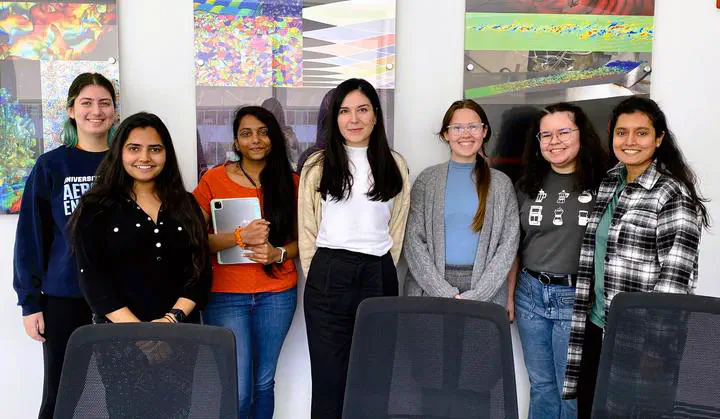Cinar gives seminar at University of Illinois Urbana-Champaign on sustainable aviation
 Gokcin Cinar with the Graduate Women in Aerospace (gradWIA) of UIUC.
Gokcin Cinar with the Graduate Women in Aerospace (gradWIA) of UIUC.Dr. Cinar visited the University of Illinois Urbana-Champaign (UIUC) as a guest speaker kindly invited by the Graduate Women in Aerospace Engineering (gradWIA) student group and the Department of Aerospace Engineering. She enjoyed meeting with students and colleagues at UIUC, and gave a seminar titled “Aviation’s Grand Challenge: Disrupting technologies for an environmentally sustainable future”.
About the talk: The global aviation industry was responsible for 915 million tons of human-induced carbon dioxide emissions in 2019, which, not surprisingly, was the year with the highest demand for air transportation in history. About 3% of global greenhouse gas emissions come from aviation today, and with more passengers and flights expected as the population expands, aviation could be producing three to five times more carbon dioxide emissions by 2050 than it did before the COVID-19 pandemic.
ICAO established long-term aspirational goals, which include 2% annual fuel efficiency improvement and eventually cutting net carbon dioxide emissions by 50% by 2050 compared with 2005 levels. To meet these aggressive goals, we need a mix of radical and disruptive technologies. Today, decarbonization is the aviation industry’s grand challenge: how do we get away from fossil fuels that we have been relying on since the dawn of aviation? Is true decarbonization even possible? What about the other harmful emissions? Can the future of flight be more efficient?
As the IDEAS Lab at the University of Michigan, our goal is to answer these questions through quantitative, system-level, and life-cycle assessments for future aircraft concepts. In this talk, I will give an overview of the most promising technologies to meet aviation’s net-zero emission goals. I will emphasize the importance of systems thinking in integrating novel technologies in the aircraft design process, and provide examples for the design space exploration and multi-disciplinary analysis and optimization of electrified aircraft.